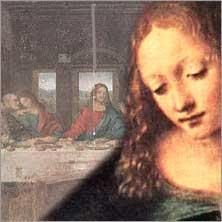Da Vinci-Sized Dispute
 Right this minute, a battle over who owns the intellectual property rights of fiction writers is taking place in a London court.
Right this minute, a battle over who owns the intellectual property rights of fiction writers is taking place in a London court.Dan Brown, author of mega-seller The Da Vinci Code, is being sued by Michael Baigent and Richard Leigh, the co-authors of the non-fiction book Holy Blood, Holy Grail. Baigent, Leigh, along with co-author Henry Lincoln, scored a bestseller in the early 1980’s with their theory that the direct descendent of Jesus and Mary Magdalene live in France. Holy Blood, Holy Grail has been said to inform Brown’s fictional story of his “symbologist” protagonist who discovers the explosive secret. Baigent and Leigh are suing for breach of copyright.
The Google Book Search fracas goes to immediate low the backburner for now. For if Baigent and Leigh win their suit, it puts something into question that fiction writers have been using freely for 500 years: can themes and ideas be copyrighted?
Most legal opinions weighing in on the case say that Brown is standing on firm footing. “You can’t copyright an idea,” says David Hooper, a solicitor specializing in copyright law. Hooper argues that unless Brown ripped off passages of Holy Blood, Holy Grail, Baigent and Leigh don’t have a case.
Baigent and Leigh charge that in his thriller, Brown has gone further than appropriating their “theory” that Jesus’ descendants live in Europe. They argue that Brown lifted their entire theory and mapped it onto his own.
You know what? I think they have a case there. Whether or not they will win the suit is another question.
I read Holy Blood, Holy Grail back in the day. I was fascinated by the twists and turns the three authors took ferreting out the “clues” embedded in Christian iconography. It set my imagination going, how could the storyteller not be beguiled by the possibilities in such a provocative claim? But many would argue (and have) that the non-fiction Holy Blood, Holy Grail IS fiction.
When I read The Da Vinci Code twenty years later, I knew immediately Holy Blood, Holy Grail served as Brown’s source and inspiration. The plot of The Da Vinci Code follows—almost to a T—the journey that the three young historians took when researching their book, down to the final plot twist that ends in a church in Scotland. Henry Lincoln (the third author not enjoined in the suit) has written a book called The Holy Place (I picked it up in a remainder bin in the early 1990's. Now it's in reprint.). In it, Lincoln studies the mountains and churches of southern France, and “decodes” the symbols in both. In fact, his work has been termed “archaeoastronomy,” a pseudo-academic title. Sort of like “symbologist.”
To be clear, I don’t think Baigent and Leigh will win their lawsuit against Brown. In fact, thanks to Brown, Holy Blood, Holy Grail is hitting the bestseller lists again.
But the case is sending a chill through the ranks of fiction writers who look to such works as inspiration for their own. We'll be watching this case very closely as it unfolds over the next few weeks.

 posted by Kathleen Bolton at
posted by Kathleen Bolton at 


0 Comments:
Post a Comment
<< Home